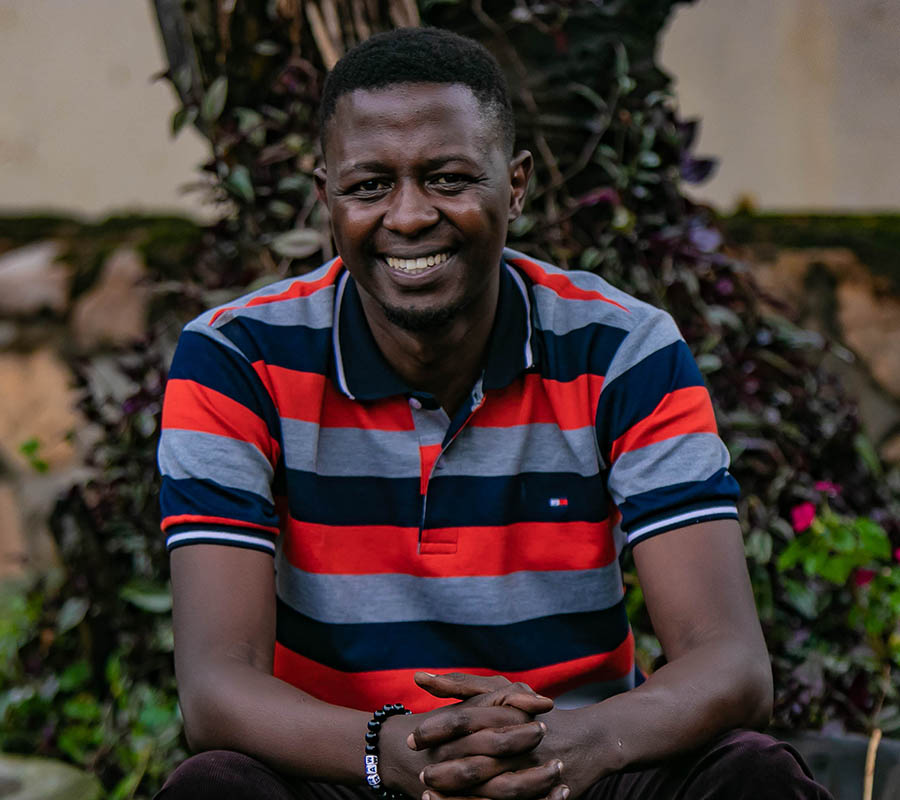Home delivered poetry in Uganda
%20poetry%20uganda.jpg)
Feedback from visitors in the library helps us identify and acquire Africa published non-fiction and fiction titles. Thanks to Kagayi Ngobi’s visit we have considerable enlarged our Ugandan section, says NAI librarian Ingela Dahlin. Photo: Kalle Laajala, NAI.
A strict Covid-19 lockdown forced Ugandan poetry performance group Kitara Nation to go into publishing. The books have now found their way to Uppsala and will make an important contribution in the NAI library.
The poets in Kitara Nation received an international grant in 2016 to popularise poetry among young people in Uganda. When authorities in mid-March last year imposed a lockdown to prevent further spread of the coronavirus, schools shut down and Kitara Nation members could no longer travel. That was when they decided to give out books.
“For literature to grow in Uganda, we need to make it a domestic culture. Families should be reading books around the dining table. But they need those books. They need Ugandan books”, Kagayi Ngobi of Kitara Nation External link, opens in new window. says.
External link, opens in new window. says.

Kagayi Ngobi.
The poets convinced grant makers to support publishing instead of performances during the pandemic. Luckily, they had a lot of archived material from previous performances and released 12 poetry books last year. Kagayi Ngobi has been told that is a record in Uganda. However, they did wonder who was going to buy the books and how – libraries and bookshops were all closed.
“We created a mobile shop where people put orders online and had books delivered at home. Then we posted stuff on social media like: ‘It’s lockdown. Are you bored at home? We have wonderful, amazing poetry books and can deliver them to you’. This strategy exceeded our expectations. We are now reprinting many of the books”, Kagayi Ngobi explains.
He visited the NAI Library at the beginning of 2020 and what stood out for him was how small the Ugandan section was. But it is the same thing in libraries and bookshops at home, he says.
“European literature is more popular than African, let alone Ugandan literature. This is why we need to take publishing as seriously as we consider performance”.
It was a live performance at the national theatre when he was a young law student that opened up the world of poetry to Kagayi Ngobi.
“The poets were not reading. They had memorised their poems and were acting them. It was beautiful and l was amazed at the power poetry can have. I joined the group and started writing, and soon realized this is what l want to do for the rest of my life”.
However, he is critical of the nation’s educational system, which he believes does not encourage young people in creative writing. This was one reason for Kitara Nation to start poetry clubs in schools and to popularise writing as a vocation. They held sessions for young people on how to write poems and workshops on reciting them. Later, they took part in poetry competitions with other schools and shows at the national theatre.
“In Uganda, literature is presumed to be for students of literature alone. So, we decided to take literature out of the literature class and make it a social culture where it doesn’t matter if you are 13 or 18, studies social science or humanities — what is important is what you want to say. And the culture grew. Now 6-7 years later, the audience that was consuming poetry performance is now consuming poetry in written form”, Kagayi Ngobi concludes.
TEXT: Johan Sävström
Here are the resources on fiction in the NAI library. Follow the link and find the Ugandan fiction brochure.
